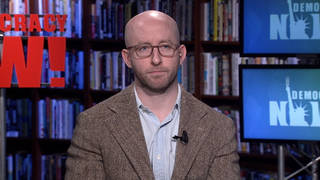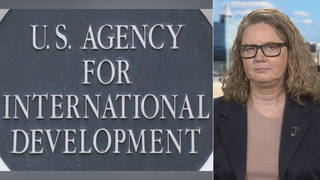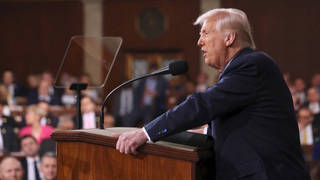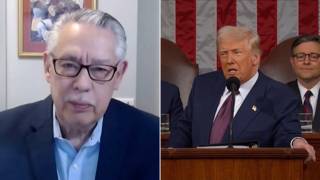
We hear an excerpt of a speech by MIT linguistics professor Noam Chomsky speaking at the 25th Anniversary of Coalition for Peace Action in Princeton. The historian and author spoke about Yasser Arafat, Iraq and the military draft. [includes rush transcript]
Palestinian leader Yasser Arafat was buried in the West Bank this weekend. For decades, Arafat was the embodiment of the Palestinian cause and the symbol of resistance against Israeli occupation. He was laid to rest in the Ramallah headquarters where was confined by Israel for the final years of his life.
Tens of thousands of Palestinians gathered around his flag-draped coffin as it was carried across the compound. Mourners wept and chanted in an emotional farewell bid to the only leader many of them have ever known. New Palestinian officials has been named to lead in the post-Arafat era but the future remains uncertain.
The new chairman of the Palestine Liberation Organization, Mahmoud Abbas, escaped injury Sunday after masked members of the Al Aksr Brigade opened fire on a gathering where Palestinians were mourning the death of Yasser Arafat. Two of Abbas’ bodygards were killed in the shooting.
This past weekend, MIT linguistics professor Noam Chomsky spoke at the 25th Anniversary of Coalition for Peace Action in Princeton, New Jersey. The historian and author of over 100 books spoke about Yasser Arafat, Iraq and the military draft. This is an excerpt of what he had to say.
- Noam Chomsky, speaking at the 25th Anniversary of Coalition for Peace Action in Princeton, New Jersey.
Transcript
AMY GOODMAN: This past weekend, MIT linguistics professor, Noam Chomsky spoke at the 25th anniversary of the Coalition for Peace Action in Princeton, New Jersey. Noam Chomsky has written over 100 books, well-known political analyst, linguist at MIT. He talked about Yasser Arafat, about Iraq, about the military draft here in this country. He spoke on Sunday. This is an excerpt of what he had to say.
NOAM CHOMSKY: I had a little time on the airplane and read this morning’s Times and there is, as expected, a front page story that is in the weekend review by a very good reporter. It’s about a highly significant topic, how to establish democracy — or the president’s messianic vision, as the Boston Globe calls it, my own newspaper. And it discusses a current example, which has had a huge amount of media commentary in the last couple days, the Palestinian issue, what happens after Arafat. The first paragraph says that the post-Arafat era will be the latest test of a quintessentially American article of faith, that elections provide legitimacy, even to the frailest institutions. Okay, that’s our quintessential article of faith. Then it goes on, and we’ll skip to the last paragraph. The last paragraph on the continuation page says there’s a paradox. In the past, the Bush administration, and he could have added every previous one, resisted new national elections among Palestinians. The thought was that the elections would make Mr. Arafat look better, and give him a fresher mandate, and might have helped give credibility and authority to Hamas. So in other words, we have a quintessential commitment to democracy, but in the single example that is given we oppose democracy because the outcome might come out the wrong way. Well, there are some conclusions you can draw from that one example. Yes, we support democracy, as long as it comes out the right way. Otherwise, we’ll block it. Now, more has to be said. The first paragraph is not false. If by Americans you mean American people, that’s quite true. It is a quintessential article of faith among the general population that we ought to have democracy and elections. It simply is rejected by every single government, and by the media and by elite opinion. Their position is we should are democracy and elections when it comes out the right way, as in this case. So, there’s really no contradiction, if you sort of interpret it properly, but the lessons are there, and the single example chosen does in fact illustrate them, and incidentally, it’s not unusual to re-find them. I often discover, probably others do too, that if you want to read an article in a major newspaper, the best way to do it is to start with the end. The last paragraph quite often has something interesting. The first paragraph usually has something for the headline writers and for the casual reader. And I don’t know if this is done consciously or not, but it’s pretty consistent. Well, let’s continue. What is illustrated by this front page article and in a series of front page articles and editorials in the last few days is a principle. The principle is that we, and we is identified with the government, not the population and–I’ll come back to this, there’s a radical difference in opinion between them, but that we, the government, are always guided by benign intent. That’s kind of like an axiom. We can make mistakes along the way, but the intention was benevolent. Try to find an exception to that way at the left liberal end of criticism in the mainstream. Well in conformity with these guidelines, the New York Times before had a front page think-piece on Arafat’s death. So did many other journals, but I’ll keep to the Times, they’re all approximately the same. The article begins by informing us, first paragraph again, that Arafat was both the symbol of the Palestinians’ hope for a viable independent state and the prime obstacle to its realization. He was never, it goes on, he was never able to reach the heights of President Anwar Sadat of Egypt, who won back the Sinai through a peace treaty with Israel in 1979 because he was able to reach out to Israelis and address their fears and hope with his visit to Jerusalem in 1977. That was the same story in every newspaper I looked at with slight nuances. There is a documentary record, rich as possible sources, unambiguous, and it happens to tell a different story. But it’s not allowed. And it is not allowed because it would violate the fundamental principle that what we do is benign, we, meaning the government, not the population. So, let’s take a look at that. The documentary record shows uncontroversially and explicitly and unambiguously that the main obstacle to the realization of the Palestinian state was Washington, and competing pretty well for second place is the New York Times and its colleagues, which have consistently “mispressed” or misrepresented the crucial facts. And the crucial facts are not in doubt. I’ll run through a small sample because it’s brief. Let’s pick some examples. So in 1976, the United States became the chief obstacle to a Palestinian state, very simply. The Security Council of the United Nations debated a resolution calling for a two-state settlement, a Palestinian settlement, a Palestinian state alongside of Israel, both states having all the rights guaranteed in the international system. This was in accord with a very broad international consensus that was supported by the Arab states, backed by the PLO and just about everybody. And in fact by then it had crystallized as an overwhelming international consensus. The U.S. vetoed. It was vetoed. The U.S. veto, incidentally, is a double veto. It vetoes the resolution and also vetoes recording in history. So it’s out of history but it happened. It happened again in 1980, the same resolution, the same again. There is a long record up to the present. It continues consistently, General Assembly initiatives from Europe, initiatives from the PLO, initiatives from the Arab states. Whatever they are, the U.S. blocks them. And that continues, the most recent dramatic case, there are plenty of others, was in Geneva in the year 2002. There are a series bases for settlement along the lines of the international consensus. It was presented by prominent Israeli and Palestinian negotiators. It was strongly supported by almost the whole world with the notable exception the United States, which alone refused to send even a message of support as was indeed reported in the New York Times in a very dismissive article, saying, this is all nonsense. Let’s go to Sadat. Well again, the facts are clear. Sadat in fact did go to Jerusalem and make a proposal, but it was not–but that proposal in 1977 repeated one that he had made in 1971. In 1971, not 1977, Sadat offered a full peace treaty to Israel in accord with official U.S. government policy offering nothing to the Palestinians. Their rights had not yet entered the international agenda. That was recognized by Israel to be a genuine peace offer. They rejected it. They preferred expansion to peace. This is the labor government. Expansion then meant into the northeastern Sinai. Important question as always is what’s the U.S. going to do under Kissinger’s initiative. The U.S. decided to reject its official policy and to support Israeli rejectionism, the policy was what Kissinger called stalemate in his memoirs. Stalemate, we prefer to stalemate not negotiations, just force. That led directly to the 1973 war. A very close call for Israel. Nuclear alert. Very close call for the world. After that, Kissinger recognized that you cannot just dismiss Egypt as a basket case, began his famous shuttle diplomacy, that led to the Camp David agreements where indeed in 1979 the United States and Israel accepted Sadat’s 1971 offer, okay. Actually from the U.S.-Israeli point of view, a harsher offer because by that time, it included a call for a Palestinian state in accordance with a new emerging international consensus, which faced an impossible obstacle, namely the U.S. government and its median commentary. Well, that goes down in history as a diplomatic triumph for the United States. In real history it’s a diplomatic catastrophe. The U.S. refusal to accept a peaceful settlement in 1971 led to a terrible war, very dangerous one, years of suffering and misery with effects that still are very much there. But it shows the advantages of owning history. You can kind of reshape it into your own — to satisfy your own needs. And you therefore get the first paragraph that I just read from the world’s leading newspaper, front page think-piece, duplicated just about everywhere in the media, and that includes journals of opinion. You might try to look for an exception. The example does illustrate again the basic guidelines of commentary, media in particular, but commentary generally. We’re good, meaning the government, not the people, we accept the totalitarian notion that we identify the people with the state, so when they say we, it means the government. The government is good. We are good, benevolent, well-intentioned, that we seek peace and justice. We’re foiled by villain who cannot rise to our exalted level. It doesn’t matter what the facts are. Not that it matters what simple logic tells us.
AMY GOODMAN: Noam Chomsky, speaking on Sunday in Princeton, New Jersey. Afterwards, he was asked a series of question, one of them was, would the draft be reinstated.
NOAM CHOMSKY: I think it’s extremely unlikely. I should tell you this as a word of personal background. I was very much involved in the resistance movement in the 1960’s. In fact, I was just barely — the only reason I missed a long jail sentence is because the Tet Offensive came along and the trials were called off. So I was very much involved in the resistance, but I was never against the draft. I disagreed with a lot of my friends and associates on that, for a very good reason, I think at least as nobody seems to agree. In my view, if there’s going to be an army, I think it ought to be a citizen’s army. Now, here I do agree with some people, the top brass, they don’t want a citizen’s army. They want a mercenary army, what we call a volunteer army. A mercenary army of the disadvantaged. And in fact, in the Vietnam war, the U.S. military realized, they had made a very bad mistake. I mean, for the first time I think ever in the history of European imperialism, including us, they had used a citizen’s army to fight a vicious, brutal, colonial war, and civilians just cannot do that kind of a thing. For that, you need the French foreign legion, the Gurkhas or something like that. Every predecessor has used mercenaries, often drawn from the country that they’re attacking like England ran India with Indian mercenaries. You take them from one place and send them to kill people in the other place. That’s the standard way to run imperial wars. They’re just too brutal and violent and murderous. Civilians are not going to be able to do it for very long. What happened was, the army started falling apart. One of the reasons that the army was withdrawn was because the top military wanted it out of there. They were afraid they were not going to have an army anymore. Soldiers were fragging officer. The whole thing was falling apart. They were on drugs. And that’s why I think that they’re not going to have a draft. That’s why I’m in favor of it. If there’s going to be an army that will fight brutal, colonial wars, and that’s the only likely kind of war, I’m not talking about the militarization of space and that kind of thing, I mean ground wars, it ought to be a citizen’s army so that the attitudes of the society are reflected in the military.
AMY GOODMAN: MIT Professor, Noam Chomsky, speaking in Princeton, New Jersey, celebrating 25 years of the Coalition for Peace Action.











Media Options